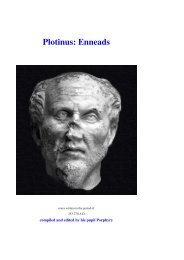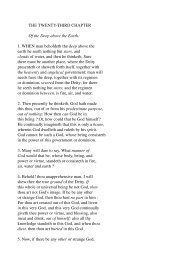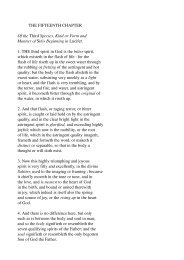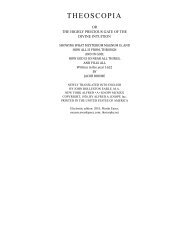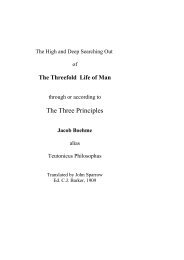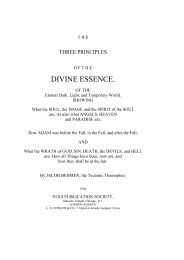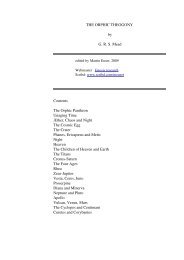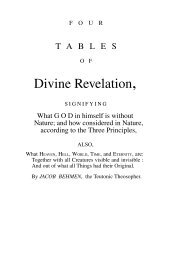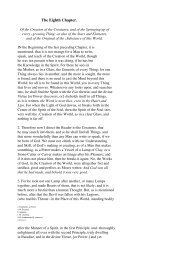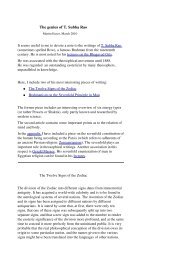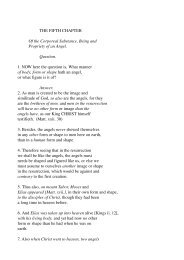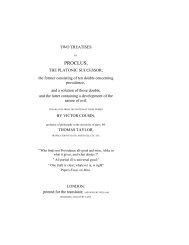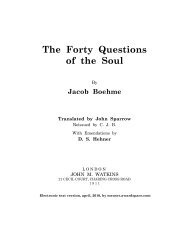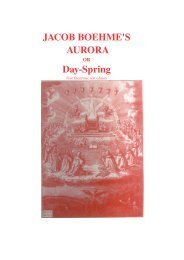Gerald Massey's Lectures - Society in evolution - Awardspace
Gerald Massey's Lectures - Society in evolution - Awardspace
Gerald Massey's Lectures - Society in evolution - Awardspace
You also want an ePaper? Increase the reach of your titles
YUMPU automatically turns print PDFs into web optimized ePapers that Google loves.
een saved by the "Word-of-Truth!" <strong>in</strong> Egypt long Ages before the Christian Era!<br />
Now, let us return for a moment to the Epistle of James canonised <strong>in</strong> the New Testament,<br />
and called by Luther "an Epistle of Straw," because it had not a gra<strong>in</strong> of Historic<br />
Christianity <strong>in</strong> it. James was the head of the Church <strong>in</strong> Jerusalem. He was titled a brother<br />
of the Lord--no doubt <strong>in</strong> relation to the Nazarite Brotherhood; the Lord be<strong>in</strong>g a typical<br />
character like Horus, Mana, or Elias, who was ignorantly assumed by the literalizers of<br />
legends to have been a Judean peasant named Jesus or Joshua. Hence the imposition of<br />
certa<strong>in</strong> family details <strong>in</strong> the Canonical Gospels, which will be traced hereafter. James is<br />
believed to have died about A.D. 60. But <strong>in</strong> the whole seven chapters of this Epistle of<br />
James, except<strong>in</strong>g an open<strong>in</strong>g salutation, there is not one s<strong>in</strong>gle sign of Historic<br />
Christianity! It recognises no Jesus of Nazareth, and it announces no salvation through<br />
the aton<strong>in</strong>g blood, the death, resurrection and ascension of a personal Christ.<br />
Noth<strong>in</strong>g whatever beg<strong>in</strong>s with or is based on the history which was afterwards made<br />
canonical, nor on the Christ that was localized at a later stage of development. Everyth<strong>in</strong>g<br />
is absent that was and still is essential to the physical faith. Instead, we f<strong>in</strong>d the exact<br />
opposite of all that was made historic <strong>in</strong> the Gospels. The doctr<strong>in</strong>e of salvation is Gnostic,<br />
Essenic and Egyptian. Salvation, accord<strong>in</strong>g to James, cometh of the "Word of Truth."<br />
Speak<strong>in</strong>g of the "Father of Lights" (Lord of Lights be<strong>in</strong>g a title of Horus) he says:--"Of<br />
his own will begat he us with the 'Word of Truth' that we should be a k<strong>in</strong>d of first fruits<br />
of his creatures." "Wherefore receive ye with meekness the implanted Word which is able<br />
to save your souls." The transaction is direct between the div<strong>in</strong>e father and the human<br />
soul. The Christ with<strong>in</strong> is the only saviour! The total teach<strong>in</strong>g of the Epistle of James is<br />
based on this ancient Egyptian Word of Truth; the implanted Word which confers the<br />
Makheru on man, which never could be represented by an historical Christ. The "Word of<br />
Truth" as rendered by James is the best possible translation of the Egyptian "Ma-Kheru."<br />
Moreover, the context shows that the Word of Truth is the Egyptian Makheru by the<br />
exhortation, "Be ye doers of the Word," which renders good Egyptian doctr<strong>in</strong>e <strong>in</strong> perfect<br />
accordance with exact Egyptian phraseology.<br />
Just as Horus Makheru was the Word of Truth; or that which was said was fulfilled<br />
<strong>in</strong>deed, so men are re-begotten <strong>in</strong> the div<strong>in</strong>e likeness by the Word of Truth; and as livers<br />
or doers of that Word they are to be saved--as it was taught <strong>in</strong> Egypt thousands of years<br />
previously without the Word of Truth becom<strong>in</strong>g <strong>in</strong>carnate <strong>in</strong> Horus as a human person.<br />
This Word of Truth, the Christ of James and Paul, which alone was able to save, is<br />
identical with that made known aforetime, which needed not to be brought down from<br />
heaven for any personal <strong>in</strong>carnation; needed not to be brought up from the dead by any<br />
physical resurrection; needed not to be sent from over the sea, because, as was said by the<br />
Mosaic mouthpiece of Egypt's Wisdom, "that Word is <strong>in</strong> thy heart that thou mayest do<br />
it!" And this is the position re-occupied; this is the teach<strong>in</strong>g re-echoed by Paul, <strong>in</strong> whose<br />
mouth the Word of Truth becomes doubly anti-historic (cf. Deut. xxx. 12-14, with<br />
Romans x. 6, 7).<br />
There is also a reference to the "Word of Truth" <strong>in</strong> Paul's Epistle to Timothy, which still<br />
further identifies the Makheru. The word Ma, for that which is true, orig<strong>in</strong>ally means to<br />
hold out straight before one. And Paul exhorts Timothy, as a workman, to hold a straight<br />
course accord<strong>in</strong>g to the Ma-kheru, or "Word of Truth." This True Voice or Word of Truth<br />
is, I take it, that liv<strong>in</strong>g and abid<strong>in</strong>g voice which is appealed to by Papias as evidence for<br />
his Christ, who was the Lord of the Logia; and, if so, his testimony thus far does not<br />
make for, but tends to <strong>in</strong>validate, the history. Of course, he is supposed to mean the voice<br />
of contemporaries when he decries what would be the more certa<strong>in</strong> voice of written<br />
records; but that is not what he means. He prefers, <strong>in</strong> reality, the traditions of the oral<br />
wisdom, and may be claimed as another witness for the non-Historical Christ. Also, the<br />
epistle to Diognetus, supposed to have been written by Marcion, conta<strong>in</strong>s the same<br />
doctr<strong>in</strong>e as the epistle of James. Speak<strong>in</strong>g of the Gnostic Christians, he says:--"They are



